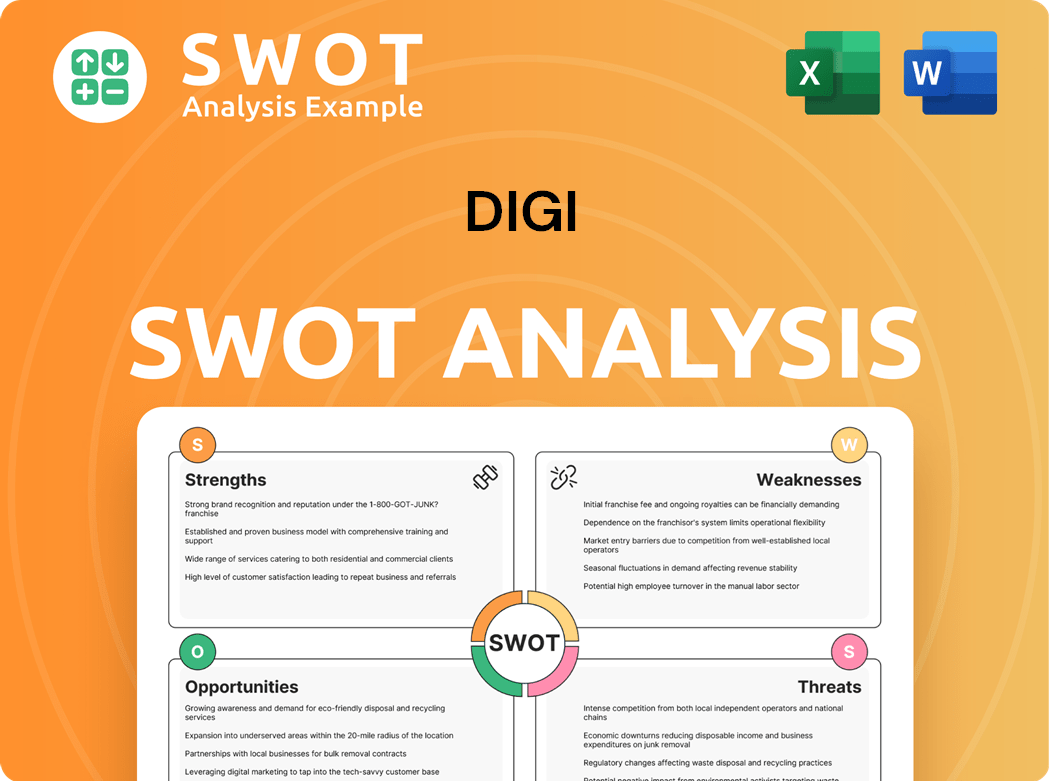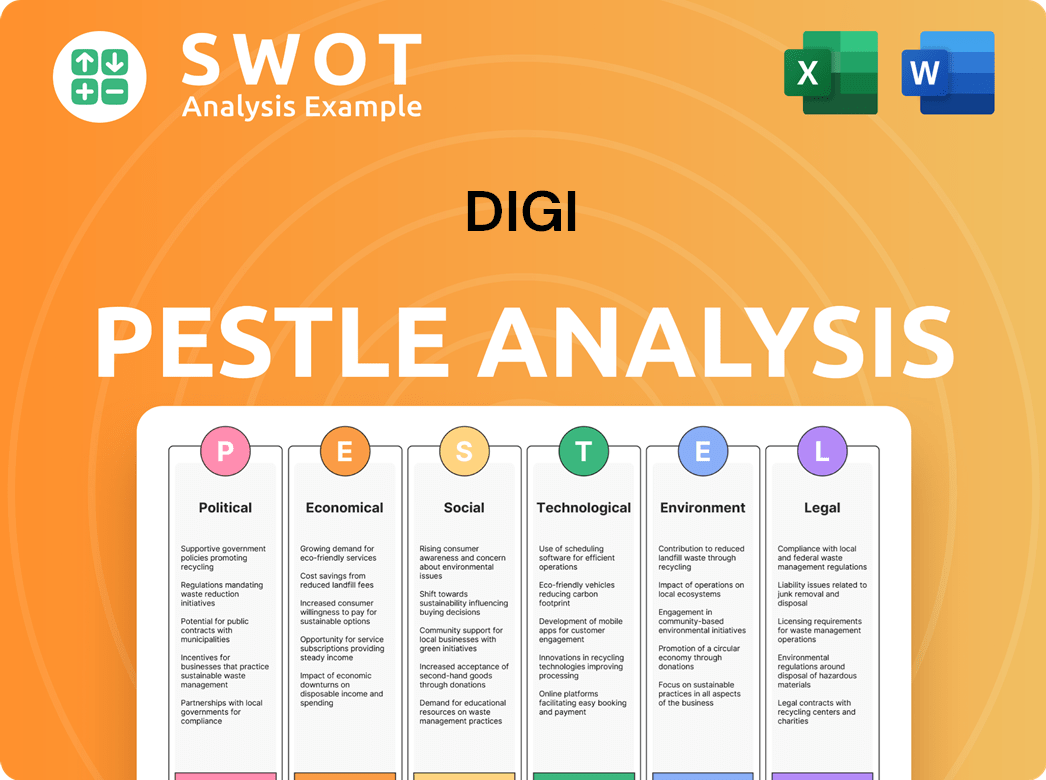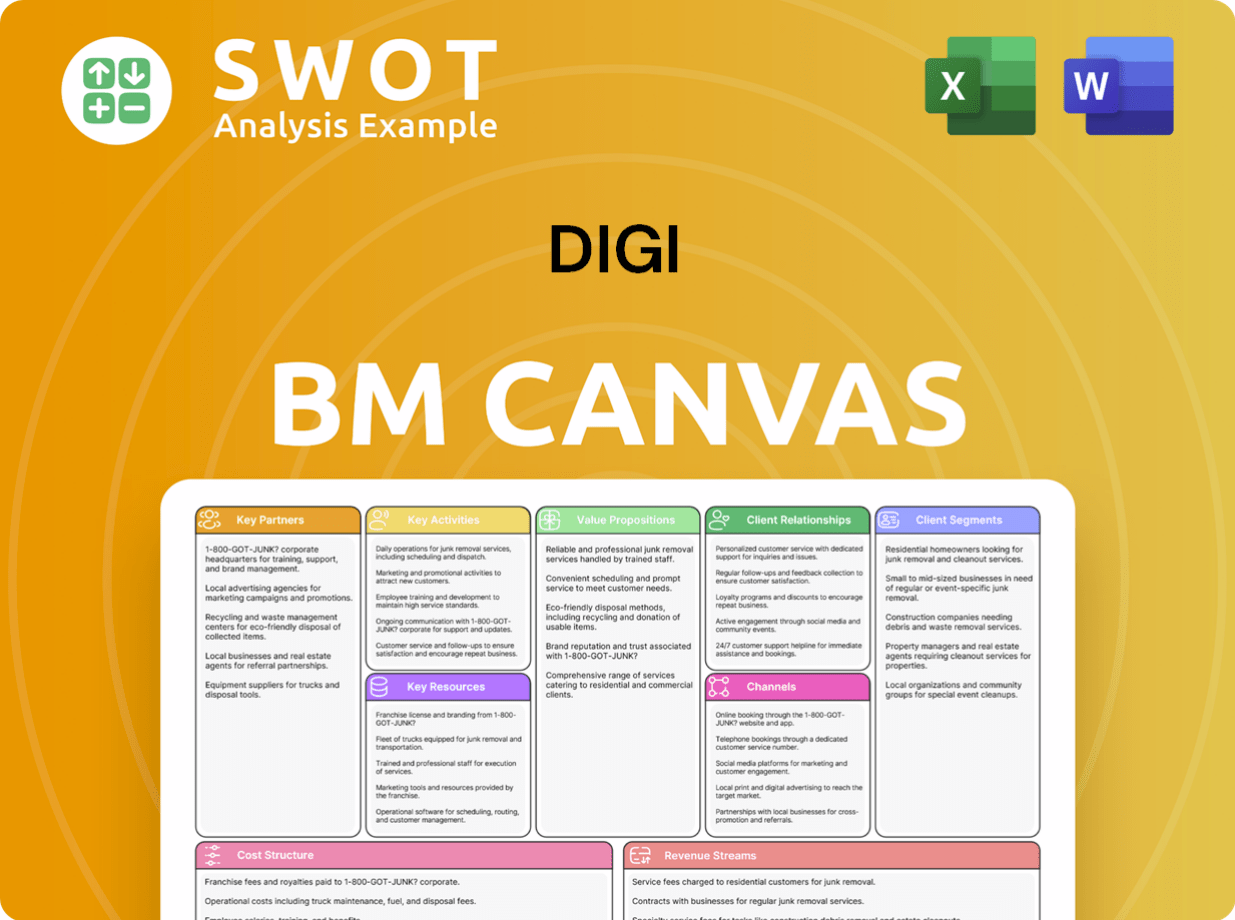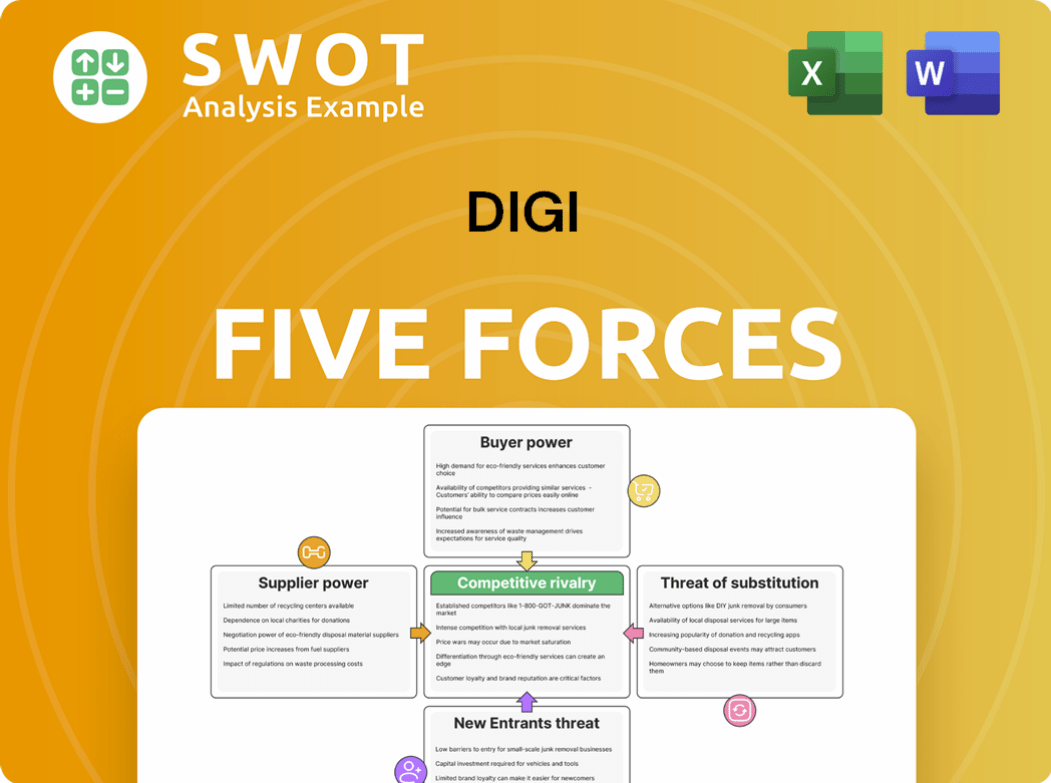Digi Bundle
How Does Digi Company Navigate the IoT Battlefield?
The Internet of Things (IoT) is reshaping industries, creating a dynamic environment where companies must constantly innovate to stay ahead. Digi International, a key player since 1985, has evolved from data communication solutions to a leading provider of IoT connectivity products and services. This Digi SWOT Analysis provides a comprehensive overview of its strategic positioning.

This article offers a deep dive into the Digi Company competitive landscape, exploring its market share analysis and strategic moves within the Digi Company industry. We'll examine Digi Company's strengths and weaknesses, analyze its key competitors, and assess its competitive positioning through detailed market analysis. Understanding the Digi Company's strategy is crucial for anyone looking to navigate the complex world of IoT.
Where Does Digi’ Stand in the Current Market?
Digi International holds a strong position within the industrial IoT connectivity sector. The company is recognized for its cellular routers and embedded solutions. The company's primary product lines serve diverse customer segments, ranging from industrial automation and smart cities to healthcare and transportation.
Digi's market presence is significant in North America and Europe, with expansion into other global markets. The strategic shift emphasizes end-to-end IoT solutions, including software and services. This approach aligns with industry trends towards recurring revenue models. For a deeper understanding of the company's approach, consider exploring the Marketing Strategy of Digi.
Financially, Digi reported revenues of $109.8 million for the second quarter of fiscal year 2024. This performance demonstrates consistent results in a competitive market. This financial health and focus on niche, high-value industrial applications solidify its standing. Digi's products often meet stringent industry standards in applications requiring ruggedized, reliable, and secure connectivity solutions.
Digi International is consistently cited among the leading providers in industrial and enterprise IoT connectivity. While exact market share figures for 2024-2025 fluctuate, the company maintains a strong competitive position. The company's focus on specialized applications contributes to its market strength.
Digi has a significant presence in North America and Europe. The company is expanding its reach into other global markets, increasing its international footprint. This global expansion is a key part of its growth strategy.
Digi emphasizes end-to-end IoT solutions, including hardware, software, and services. This approach supports recurring revenue models. The company's product lines, such as Digi XBee, Digi Connect, and Digi Remote Manager, are key to its strategy.
Digi reported revenues of $109.8 million for the second quarter of fiscal year 2024. This financial performance indicates consistent results in a competitive market. The company's financial health supports its market position.
Digi's strengths include its focus on ruggedized, reliable, and secure connectivity solutions. The company's products often meet stringent industry standards. This focus allows Digi to compete effectively in high-value industrial applications.
- Strong market position in industrial IoT.
- Diverse product offerings, including hardware, software, and services.
- Consistent financial performance, with $109.8 million in revenue in Q2 2024.
- Strategic geographic presence in North America, Europe, and expanding globally.
Digi SWOT Analysis
- Complete SWOT Breakdown
- Fully Customizable
- Editable in Excel & Word
- Professional Formatting
- Investor-Ready Format

Who Are the Main Competitors Challenging Digi?
The Digi Company competitive landscape is shaped by a diverse array of players. These competitors range from large multinational corporations to specialized niche providers. This competition spans across its product and service offerings, making the Digi Company market analysis complex.
Understanding the Digi Company competitors is crucial for assessing its market position and strategic direction. The competitive environment is dynamic, influenced by technological advancements, market trends, and strategic moves by key players. Analyzing these factors is essential for making informed decisions about the company's future.
In the cellular router and gateway segment, Digi Company key competitors include Sierra Wireless (now part of Semtech), Teltonika Networks, and Cradlepoint (a subsidiary of Ericsson). Sierra Wireless offers a wide range of IoT modules, gateways, and connectivity services, often competing on scale and comprehensive offerings for enterprise clients. Teltonika Networks focuses on robust and cost-effective industrial routers, competing aggressively on price and features in various industrial applications. Cradlepoint, with its cloud-managed LTE and 5G solutions, directly challenges Digi in enterprise networking and primary wireless connectivity.
Offers a broad portfolio of IoT modules, gateways, and connectivity services. Competes with Digi on scale and comprehensive offerings for enterprise clients.
Known for robust and cost-effective industrial routers. Competes aggressively on price and features in various industrial applications.
Provides cloud-managed LTE and 5G solutions. Directly challenges Digi in the enterprise networking and primary wireless connectivity space.
A key player in the embedded systems and module market. Competes on factors like power consumption, form factor, and integration capabilities.
Offers a range of embedded wireless modules and antennas. Focuses on providing reliable connectivity solutions for various applications.
Offers broader industrial IoT platforms and solutions. Indirect competition through integrated offerings that may include connectivity components.
In the embedded systems and module market, competitors include u-blox, Laird Connectivity (now part of Ezurio), and various semiconductor manufacturers. These companies compete on factors such as power consumption, form factor, integration capabilities, and development ecosystem. Indirect competition also arises from larger technology companies like Cisco, Huawei, and Siemens, which offer broader industrial IoT platforms and solutions that may incorporate their own or third-party connectivity components. The competitive landscape is also being shaped by emerging players focused on specific IoT verticals or leveraging new technologies like LPWAN (Low-Power Wide-Area Networks) or satellite IoT, creating new challenges and opportunities for market share shifts. For a deeper dive into the company's background, consider reading a Brief History of Digi.
The Digi Company industry is highly competitive, with constant innovation and market shifts. Understanding the Digi Company strategy involves analyzing how it positions itself against these competitors.
- Market Share Analysis: Assessing the market share of each competitor provides insights into their relative strengths and weaknesses.
- SWOT Analysis: A Digi Company SWOT analysis helps identify its strengths, weaknesses, opportunities, and threats in relation to its competitors.
- Competitive Advantages: Identifying Digi Company competitive advantages, such as technological expertise or strong customer relationships, is crucial.
- Financial Performance: Comparing Digi Company financial performance compared to competitors reveals its profitability and efficiency.
- Recent Acquisitions: Analyzing Digi Company recent acquisitions and their impact on the competitive landscape and market position.
Digi PESTLE Analysis
- Covers All 6 PESTLE Categories
- No Research Needed – Save Hours of Work
- Built by Experts, Trusted by Consultants
- Instant Download, Ready to Use
- 100% Editable, Fully Customizable

What Gives Digi a Competitive Edge Over Its Rivals?
Understanding the competitive advantages of Digi International is crucial for a thorough Digi Company competitive landscape analysis. Digi distinguishes itself in the IoT connectivity market through a focus on industrial-grade solutions. This specialization allows Digi to cater to demanding use cases, setting it apart from general-purpose networking equipment.
Digi's competitive edge stems from its ability to provide highly reliable and secure connectivity solutions, essential for critical infrastructure and industrial applications. The company's proprietary technologies, such as the Digi Remote Manager (DRM) platform, offer centralized management and control, enhancing operational efficiency. This focus has cultivated strong customer loyalty, particularly among enterprises and industrial clients.
A comprehensive Digi Company market analysis reveals that Digi's strengths lie in its deep expertise and focus on industrial-grade, highly reliable connectivity solutions. Their products are known for their ruggedness, security features, and ability to operate in harsh environments. This specialization allows them to cater to demanding use cases that general-purpose networking equipment may not address effectively. Digi's strong brand equity and extensive channel partner network further amplify their reach and ability to serve diverse customer segments.
Digi's focus on industrial-grade solutions provides a significant competitive advantage. Their products are designed to withstand harsh environments, ensuring reliability in critical applications. This specialization allows Digi to serve demanding use cases that general-purpose networking equipment may not effectively address, solidifying their position in the market.
The Digi Remote Manager (DRM) platform offers centralized management and control of Digi devices. This proprietary technology enhances operational efficiency for customers, creating a sticky ecosystem. The DRM platform streamlines device management, making it easier for customers to monitor and control their IoT deployments.
Digi benefits from strong brand equity and a reputation for quality and customer support. Their extensive channel partner network amplifies their reach and ability to serve diverse customer segments. This strong network allows Digi to effectively distribute its products and services, reaching a wider customer base.
Digi leverages focused R&D investments to maintain a technological edge in its niche. This allows them to continuously innovate and improve their products. These investments are key to maintaining a competitive advantage and meeting evolving market demands.
Digi's competitive advantages are rooted in its specialized approach to the IoT connectivity market. These strengths contribute to a strong market position. Understanding these advantages is essential for a thorough Digi Company overview and competitive intelligence report.
- Industrial-Grade Focus: Providing robust solutions for demanding environments.
- Proprietary Technology: DRM platform enhances operational efficiency.
- Strong Brand Reputation: Built on quality and customer support.
- Extensive Channel Network: Broadens market reach and customer service.
For further insights into Digi's business model, consider exploring the Revenue Streams & Business Model of Digi. This article provides a deeper understanding of how Digi generates revenue and operates within the market, complementing the Digi Company market share analysis and helping to inform investment decisions.
Digi Business Model Canvas
- Complete 9-Block Business Model Canvas
- Effortlessly Communicate Your Business Strategy
- Investor-Ready BMC Format
- 100% Editable and Customizable
- Clear and Structured Layout

What Industry Trends Are Reshaping Digi’s Competitive Landscape?
Analyzing the Owners & Shareholders of Digi involves understanding its competitive landscape, market analysis, and strategic positioning within the IoT industry. This overview will delve into industry trends, potential challenges, and growth opportunities for Digi.
The company's success hinges on its ability to navigate a dynamic market, address emerging challenges, and capitalize on the opportunities presented by the evolving IoT landscape.
The IoT industry is experiencing substantial growth, with the global IoT market size valued at USD $212.1 billion in 2019 and is projected to reach USD $1,854.76 billion by 2030, growing at a CAGR of 24.7% from 2020 to 2030. 5G technology's rollout presents both challenges and opportunities, demanding new product development while also unlocking new applications. Cybersecurity is a critical trend, necessitating continuous investment in secure hardware and software solutions. Regulatory changes, particularly around data privacy and infrastructure security, also influence product design and market access.
Intense price competition from Asian manufacturers poses a significant challenge, requiring continuous innovation. The convergence of IT and OT networks presents complexities, demanding solutions that bridge these traditionally separate domains. Market volatility and economic downturns can also impact Digi's financial performance and strategic planning. The need to continuously adapt to rapid technological advancements is crucial for maintaining a competitive edge.
Expansion of smart city initiatives, increasing adoption of IoT in healthcare for remote patient monitoring, and the ongoing digital transformation of industrial sectors offer significant growth opportunities. Emerging markets present untapped potential for IoT adoption. Strategic partnerships and acquisitions can expand technological capabilities and market reach. The industrial IoT market is expected to reach USD $1.1 trillion by 2028, presenting a substantial growth opportunity.
Digi is likely to continue focusing on high-value industrial IoT applications. Investing in research and development for next-generation connectivity solutions, including 5G and edge computing, is crucial. Strategic partnerships or acquisitions can expand technological capabilities and market reach. Adapting to these trends and leveraging core strengths will be crucial for sustaining a competitive position.
Digi's competitive landscape includes established players and emerging competitors, making market share analysis essential. Understanding the strengths and weaknesses of competitors is critical for strategic positioning. Digi's ability to innovate and adapt to rapid technological changes will be key to its success.
- Focus on high-value industrial IoT applications.
- Invest in R&D for next-generation connectivity.
- Explore strategic partnerships and acquisitions.
- Adapt to evolving market trends and regulations.
Digi Porter's Five Forces Analysis
- Covers All 5 Competitive Forces in Detail
- Structured for Consultants, Students, and Founders
- 100% Editable in Microsoft Word & Excel
- Instant Digital Download – Use Immediately
- Compatible with Mac & PC – Fully Unlocked

Related Blogs
- What are Mission Vision & Core Values of Digi Company?
- What is Growth Strategy and Future Prospects of Digi Company?
- How Does Digi Company Work?
- What is Sales and Marketing Strategy of Digi Company?
- What is Brief History of Digi Company?
- Who Owns Digi Company?
- What is Customer Demographics and Target Market of Digi Company?
Disclaimer
All information, articles, and product details provided on this website are for general informational and educational purposes only. We do not claim any ownership over, nor do we intend to infringe upon, any trademarks, copyrights, logos, brand names, or other intellectual property mentioned or depicted on this site. Such intellectual property remains the property of its respective owners, and any references here are made solely for identification or informational purposes, without implying any affiliation, endorsement, or partnership.
We make no representations or warranties, express or implied, regarding the accuracy, completeness, or suitability of any content or products presented. Nothing on this website should be construed as legal, tax, investment, financial, medical, or other professional advice. In addition, no part of this site—including articles or product references—constitutes a solicitation, recommendation, endorsement, advertisement, or offer to buy or sell any securities, franchises, or other financial instruments, particularly in jurisdictions where such activity would be unlawful.
All content is of a general nature and may not address the specific circumstances of any individual or entity. It is not a substitute for professional advice or services. Any actions you take based on the information provided here are strictly at your own risk. You accept full responsibility for any decisions or outcomes arising from your use of this website and agree to release us from any liability in connection with your use of, or reliance upon, the content or products found herein.